EU Censures Terrorist Attacks On Israel
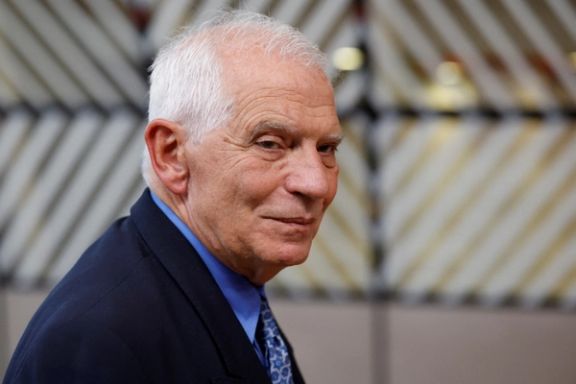
The European Union has slammed recent rocket and terrorist attacks against Israel, reiterating the country’s right to defend itself.

The European Union has slammed recent rocket and terrorist attacks against Israel, reiterating the country’s right to defend itself.
However, the EU’s Foreign Policy Chief, Josep Borrell, stressed that “any response must be proportionate and in line with international law”.
As Israeli Prime Minister Benjamin Netanyahu's government seeks to improve ties with the European body, Foreign Minister Eli Cohen met with Borrell in Brussels on Tuesday.
The EU’s Spanish diplomat urged Israel to refrain from “measures that could heighten the already high level of tension and jeopardize the very possibility of a future just and sustainable peace based on the two-state solution.”
During his visit, Cohen also discussed Iranian attempts to target Jews and Israelis on European soil with EU Parliament President Roberta Metsola.
According to the Times of Israel, they discussed the importance of the EU listing the Iranian Revolutionary Guard Corps as a terrorist group and banning all business with it.
In January, the European Parliament called on the 27-state body to list the Revolutionary Guards as a terrorist entity, blaming it for the repression of domestic protests and the supply of drones to Russia.
However, Borrell claimed the EU cannot list Iran's IRGC as a terrorist entity until a European court has determined that they are.
“European countries understand today more than ever the danger from Iran, and see eye-to-eye with Israel regarding the need to confront terror that comes from and is funded by the Iranian regime,” Cohen stated after the meeting with Metsola.
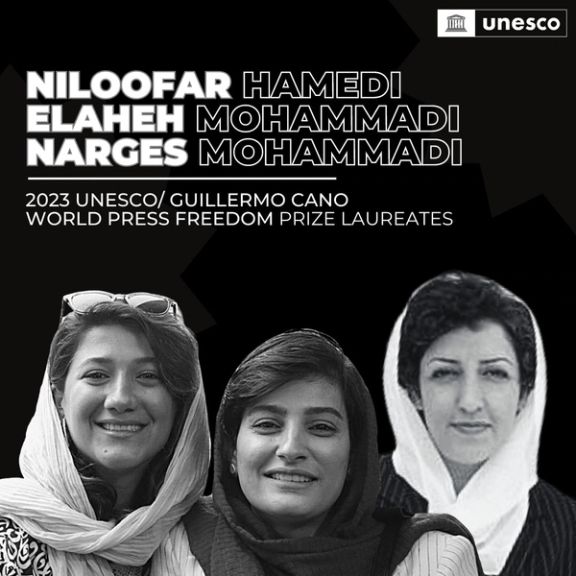
Three Iranian journalists currently behind bars have received the UN's most prestigious award for freedom of expression.
All three of them women and famous voices of Iran, have been awarded The 2023 UNESCO/Guillermo Cano World Press Freedom Prize.
Niloofar Hamedi, Elaheh Mohammadi, and Narges Mohammadi have become tools of the regime to suppress voices of dissent at a time when female journalists are increasingly under threat in Iran. It is believed around 70 journalists are currently behind bars, that number rocketing since the protests began in September.
Elaheh Mohammadi wrote about Mahsa Amini's funeral, and Hamedi broke the news that Amini died in morality police custody last September. Narges Mohammadi is renowned for her activism.
Amini’s death sparked months of protests in dozens of Iranian cities. This was one of the most significant threats to the Islamic Republic since the 2009 Green Movement rallies that drew millions of people to the streets.
“Now more than ever, it is important to pay tribute to all women journalists who are prevented from doing their jobs and who face threats and attacks on their personal safety,” said Audrey Azoulay, the UNESCO Director-General, on Tuesday during a ceremony in New York.
Zainab Salbi, the Jury Chair also said UNESCO is “committed to honoring the brave work of Iranian female journalists whose reporting led to a historical women-led revolution”.
The UNESCO/Guillermo Cano World Press Freedom Prize was established in 1997. Named after Colombian journalist Guillermo Cano Isaza, assassinated in front of his newspaper, El Espectador, in Bogotá, in 1986, it is given annually to individuals, organizations, or institutions that have made an outstanding contribution to press freedom in dangerous environments.
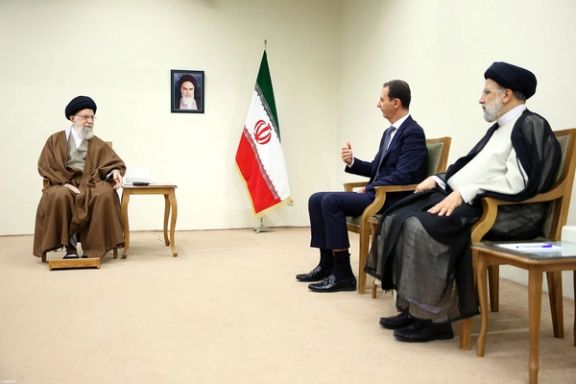
Media in Iran and the region have been speculating on the purpose and implications of President Ebrahim Raisi's two-day visit to Syria this week.
While media in Iran mainly dealt with Tehran's benefit from 12 years of fighting in Syria, reports from the region were mainly factual and often based on Iranian agencies' output.
Raisi's visit to Damascus is the first such visit by an Iranian President since the start of war in Syria 12 years ago.
Khabar Online quoting Israeli media said that Israel is worried about Raisi's visit to Syria. The website also quoted former diplomat and an Iranian expert on the Middle East Sabah Zanganeh, a political figure close to Supreme Leader Ali Khamenei, as saying that Iran has supported Syria's territorial integrity and Syrian people's security during the past 12 years.
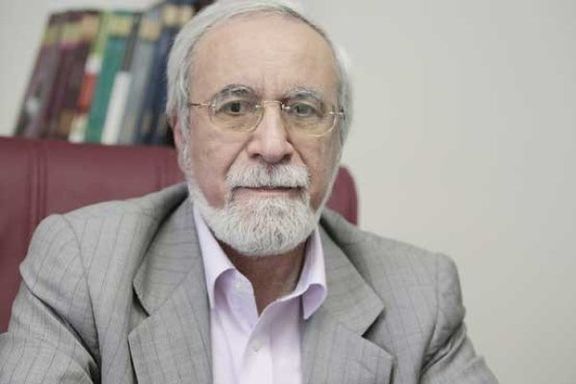
Iran intervened in Syria as soon unrest began in 2011 and reportedly played a major role in pushing the Assad regime to use overwhelming military force against the opposition.
Zanganeh reiterated Iranian regime’s rhetoric that insecurity in Syria can also affect Iran's security. Therefore, it is essential that the two countries' officials cooperate and coordinate their efforts about dealing with terrorism in the region which hinders trade with Iran via Syria's Mediterranean ports, a flimsy excuse given the fact that major ports remain under government control. Zanganeh's statement contradicted Iran's official claims about having ended terrorism in Syria.
Zanganeh generally described the purpose of Raisi's visit as discussing regional issues. Khabar Online noted that the foreign ministers of Egypt and Saudi Arabia have already visited Damascus, and Raisi's visit can facilitate talks between Damascus and Riyadh.
In a rather pessimistic report, Etemad Online quoted former senior diplomat Ebrahim Rahimpour as warning that Iran should stay alert to reap the benefits of its long and costly support for Assad’s regime. He also argued that Assad should visit Tehran to thank Iranian officials for their help and support which has led to his survival.
He pointed out that Assad's previous visit was done secretly and some Iranian officials including former Foreign Minister Javad Zarif were kept in the dark about his visit. This time he should visit Iran in the same manner he recently visited some Persian Gulf states.
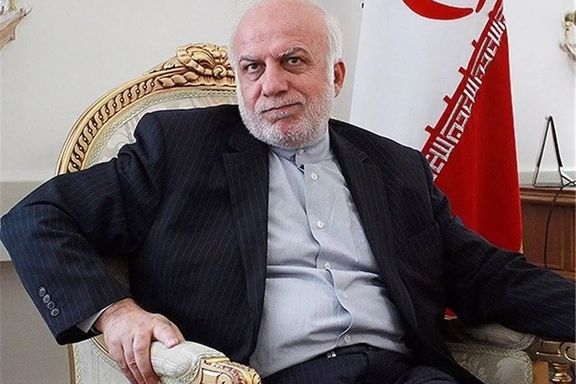
Rahimpour claimed that Iran has more influence than Russia in Syria. Meanwhile, he said that Iranian officials should not limit their foreign visits to a few countries. He was obviously mindless of the fact because of sanctions most Iranian officials cannot visit more than a handful of countries.
Rahimpour added that during Raisi's visit, Tehran should complain about Syria taking part in meetings with Russia and Turkey without Iran. He said ironically, “some of those we help, tend to forget us when their problems are solved.”
Among the media in the region, Al-Ahram's report in Egypt was totally based on the output of Iranian official news agency IRNA. The report called the visit "very important" without saying why. It also used Iran's rhetoric which called Raisi "Doctor Raisi."
Syria's official news agency SANA featured a very brief report with formulaic sentences such Raisi will be accompanied by " a high-ranking political and economic ministerial delegation," and that he will discuss with Assad "positive developments in the region."
London-based Asharq al-Awsat reported about Iran's plans to invest in the energy sector in Syria and quoted Arabic sources as saying that Syria is looking forward to an agreement with Iran in the areas of energy and electricity.
However, the fact is that Iran is in a financial crisis and unable to invest even in its own energy sector, starved of money and technology.
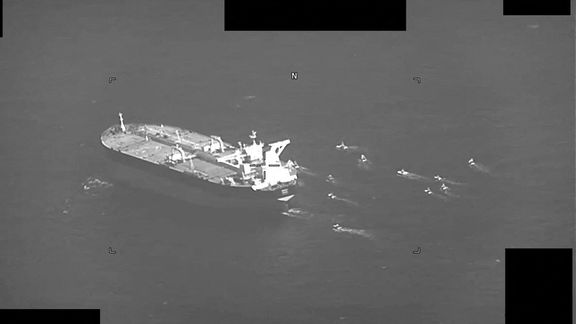
Iran has seized a second oil tanker in a week on Wednesday in Persian Gulf waters, the US Navy said, the latest escalation in a series of attacks on commercial vessels since 2019.
The Bahrain-based US Fifth Fleet said the Panama-flagged oil tanker Niovi was seized by Iran's Islamic Revolutionary Guard Corps Navy (IRGCN) at 6:20 a.m. (0220 GMT) while passing through the narrow Strait of Hormuz.
The incident comes after Iran on Thursday seized a Marshall Islands-flagged oil tanker in the Gulf of Oman called the Advantage Sweet. That tanker is being held by Iranian authorities in Bandar Abbas, the Marshall Islands flag registry said on Tuesday.
Maritime security firm Ambrey has said it believed the Advantage Sweet's seizure by Iran was in response to a recent seizure via a court order by the United States of an oil cargo aboard the Marshall Islands tanker Suez Rajan.
The Niovi oil tanker had been travelling from Dubai toward the UAE's Fujairah port when it was forced by IRGC boats to change course towards Iranian territorial waters, the Navy said.
The Niovi last reported its position at 0231 GMT on Wednesday off the coast of Oman in the Strait of Hormuz with Fujairah as its destination, Refinitiv ship tracking data showed.
According to the International Maritime Organization shipping database, the Niovi's owner is Grand Financing Co, and the ship is managed by Greece-based Smart Tankers.
"Heightened military activity and geopolitical tensions in these regions continue to pose serious threats to commercial vessels," the Marshall Islands flag registry said in an advisory on Tuesday.
"Associated with these threats is the potential for miscalculation or misidentification, which could lead to aggressive actions."
Since 2019, there have been a series of attacks on shipping in the strategic Persian Gulf waters at times of tension between the United States and Iran.
Indirect talks between Tehran and Washington to revive Iran's 2015 nuclear pact with world powers have stalled since September over a range of issues, including the Islamic Republic's violent crackdown on popular protests, Tehran's sale of drones to Russia and acceleration of its nuclear program.
Reporting by Reuters

Tech giant Microsoft warns Iran continues to be a global threat with its state-backed hackers expanding their activities.
To achieve its geopolitical goals, Iran is now expanding its cyber playbook to include disinformation campaigns, Microsoft said in a report on Tuesday.
According to the report, the Iranian government has been involved in 24 "cyber-enabled influence operations" in 2022, three times higher than 2021, when there were seven.
The majority of these operations are attributed to Emennet Pasargad, a sanctioned Iranian state actor that is seeking to undermine the poll integrity in 2020.
“[Iran] is now supplementing its traditional cyberattacks with a new playbook, leveraging cyber-enabled influence operations (IO),” added the big tech firm.
Although Iranian techniques may have changed, their targets have not. Persian Gulf states, prominent Iranian opposition figures and groups, and Israel remain the targets of these operations.
Accordingly, Iran directed nearly a quarter (23%) of its cyber operations against Israel between October of 2022 and March of 2023, with the United States, United Arab Emirates, and Saudi Arabia also bearing the brunt of these efforts.
“Iranian cyberattacks and influence operations are likely to remain focused on retaliating against foreign cyberattacks and perceived incitement of protests inside Iran,” warns Microsoft.
Microsoft Threat Intelligence revealed a threat from the Iranian hackers, known as "Mint Sandstorm" in April claiming they are targeting critical US infrastructure including transport, energy and ports.
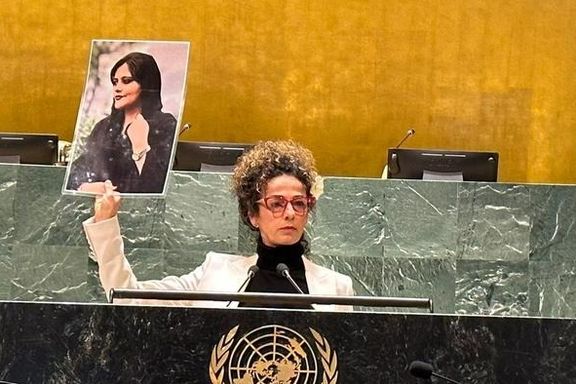
Iranian American journalist, author, and women's rights campaigner Masih Alinejad presented a draft resolution to the UN condemning targeting journalists.
In her campaign, coinciding with World Press Freedom Day, she called upon the UK to sponsor the resolution in a bid to recognize the threats made to Iran International journalists who in February, were forced to evacuate the London offices and relocate to Washington after being warned that authorities could no longer protect them from threats originating with Iranian agents.
"The UK government actually asked one of the biggest [broadcasters], Iran International TV, to stop its activities and to move from the UK. It was advice. So, I want to call on you, the UK government … and the General Assembly to pass this [resolution]," Alinejad told delegations in attendance in the General Assembly Hall.

The appeal comes just days after it was revealed that Iran is the world’s second worst country, only after China, for the repression and imprisonment of journalists.
Worsened by revolutionary unrest, Iran jailed three times the number of writers in 2022 than 2021 as it cracked down on voices of dissent. The findings, from PEN America’s latest Freedom To Write Index, showed the extent of oppression haunting the country’s writers and journalists, heightened after the death in custody of 22-year-old Mahsa Amini in September.
Alinejad, who was forced into exile in 2009, is an outspoken critic of the Islamic Republic, and the founder of a campaign against gender apartheid practices in that country, where women who choose to appear in public without a hijab risk fines, arrest, imprisonment, and death.
In 2021, the US Department of Justice announced conspiracy charges against Iranian agents that sought to kidnap Alinejad from New York and rendition her to the Islamic Republic. Earlier this year, the Justice Department filed charges in a murder-for-hire plot directed against her by the Iranian regime.
Within Iran, the Intelligence Ministry has reportedly ordered journalists and activists to remove posts on social media about chemical attacks perpetrated against schoolgirls, and dozens of journalists have been arrested over the last seven months because they reported on nationwide anti-regime protests sparked by the death of 22-year-old Mahsa Amini while in police custody for allegedly violating the compulsory hijab laws.
Alinejad has long been a proponent for oppressed journalists who are living in fear both at home and abroad as the Iran International case proved. She said that with more than 70 journalists currently in jail in Iran, the risks continue.
She recently said: "The Islamic Republic uses the tools of the state – surveillance, intimidation, violence, and a corrupt judiciary – to browbeat people into submission, but they are failing. Even though being a journalist in Iran can land you in jail, can get you killed, can get you tortured, they are failing. But they cannot be left to fight alone.”
Some of the country’s leading voices have been severely punished in recent months including Nasrin Sotoudeh, who was threatened with being returned to jail after speaking to or writing for international media outlets; author and activist Narges Mohammadi, who bravely continued to speak out from Evin prison; and writer Golrokh Ebrahimi Iraee, arrested in September.
Last week, Karin Deutsch Karlekar, PEN America’s director of Free Expression at Risk Programs, said: “Iran’s creative community—long at the forefront of fighting for free expression and human rights—was singled out as part of a broader crackdown on dissent in 2022. Alongside the dozens of writers and artists detained, the harsh sentences handed down and custodial abuse faced by some prisoners were an attempt to warn others to keep silent.”